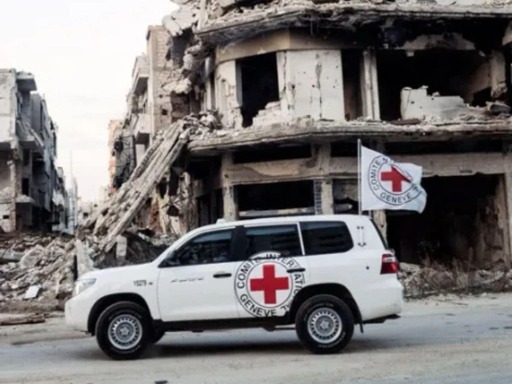On October 7, 2023, the Israeli regime suspended International Committee of the Red Cross (ICRC) visits to all Palestinian political prisoners held in Israeli occupation jails, under the pretext of “security concerns”.
ICRC plays an essential humanitarian role for Palestinian detainees
The organisation has a long history of visiting Palestinians detained by the Israeli regime, and of facilitating family visits that are often otherwise impossible to arrange.
Sarah Davies, from the ICRC delegation in Israel and the Occupied Territories, told The Canary:
In the first nine months of 2023, we facilitated permits for almost 50,000 family members and transported those who could conduct family visits to their relatives in Israeli detention facilities. This complex programme involved facilitating the request for permits as well as the transportation of family members. In the last 10 years, the ICRC transported around one million relatives to visit their detained loved ones, at a rhythm of one or two family visits per month.
Katz says ICRC visits could “harm state security”
Israeli occupation Minister of Defense Israel Katz has confirmed that these visits will remain suspended “until further notice”, claiming they “may be exploited to convey messages or information that could harm state security”.
On October 29, he signed an order barring ICRC visits not only to Palestinian political prisoners from the West Bank who are detained by the occupation, but also to those from Gaza whom Israel deems “unlawful combatants”.
‘Unlawful combatants’ lack legal protection, but term not recognised under international law
In the case of the Israeli regime, the label of “unlawful combatant” is being used not only against resistance fighters — who, under international law, have the right to resist their occupier by any means — but also against civilians. Large numbers of Palestinian civilians in Gaza — including doctors such as Hussam Abu Saffiyah, more than 50 journalists, humanitarian first responders, and even children kidnapped by Israel — are being wrongly labelled as “unlawful combatants.”
They are held without formal charge or trial and are not permitted to receive visits from lawyers. These detainees suffer systematic torture and abuse at the hands of the Israeli occupation. Although international law prohibits the detention without trial of residents of an occupied territory except in highly exceptional cases, this policy has been institutionalised through Israeli occupation laws.
According to a September 2025 report from The Guardian, based on an Israeli military database, only about a quarter of Gaza detainees were classified as fighters by intelligence, with the rest being civilians. Nevertheless, the occupation has continued expanding its use of the “unlawful combatant” law — drawing sharp criticism from human rights groups.
Banning ICRC visits is a violation of international law
The ban on ICRC visits violates international obligations — particularly those outlined in the Geneva Conventions — which grant the organisation access to all detainees in armed conflicts.
Davies explains:
Wherever and whoever they may be, detainees need to be treated with humanity and dignity at all times. This is an international legal requirement applicable to all detaining authorities in Israel and the occupied territories.
The decision also eliminates crucial independent oversight of the treatment and conditions of Palestinian detainees — at a time when unprecedented violations are being committed against Palestinians who have been arrested, detained, and forcibly disappeared by the Israeli regime.
According to the Palestinian Prisoners’ Society (PPS), preventing ICRC teams from visiting thousands of Palestinian political prisoners “constitutes an additional cover for the prison system to continue and intensify its crimes — including the slow killing of prisoners, while concealing evidence of abuse.”
No oversight on horrendous abuses of Palestinian prisoners without ICRC visits
Testimonies from those recently released confirm this abuse — as do the bodies of martyred prisoners returned by the Israeli occupation. The occupation refused to identify almost all of these bodies, instead sending them back with no names or ID — only numbers.
Many bore overwhelming evidence of brutality, including torture, hanging, starvation, and organ theft. Others were unrecognisable when received, due to the torture and abuse they endured before death. A large number arrived blindfolded and handcuffed, with visible signs of mutilation — indicating they were likely executed.
Many thousands of Palestinians continue to be physically and psychologically tortured and starved in Israeli occupation prisons and detention camps. A vast number of these detainees are held under “administrative detention” or “unlawful combatant” status — meaning they are charged with no crime and tried by no court.
Israeli occupation’s ‘justice system’ fully responsible for systematic abuse and torture of Palestinian detainees
The Palestinian Prisoners’ Society (PPS) accuses the Supreme Court and the wider judicial system of the Israeli occupation of direct responsibility for the systematic human rights violations against Palestinian detainees. It says they have “actively enabled the colonial regime’s genocidal policies — including those carried out inside prisons — through torture, starvation, denial of medical care, sexual assaults, and degrading detention conditions.”
Sarah Davies told The Canary:
The ICRC stands prepared to resume its regular detention visits at the earliest opportunity to continue, among other things, monitoring the treatment of detainees and the conditions of detention in all relevant facilities. This remains a priority for the ICRC in Israel and the occupied Palestinian territory. Committed to its mandate and responsibilities, the ICRC will continue stressing to the relevant authorities their obligations for as long as it is necessary.
Katz’s decision to block ICRC visits comes shortly after the Knesset’s preliminary approval of legislation that would allow the execution of Palestinian prisoners.
Featured image via RedCrossWebsite
By Charlie Jaay
From Canary via this RSS feed


